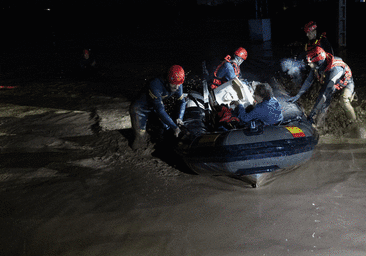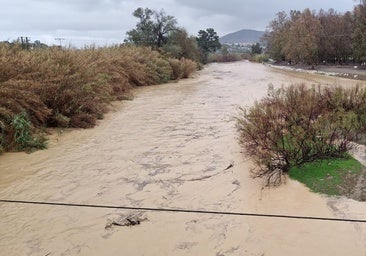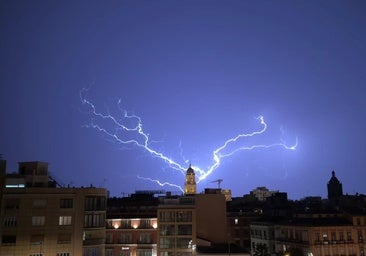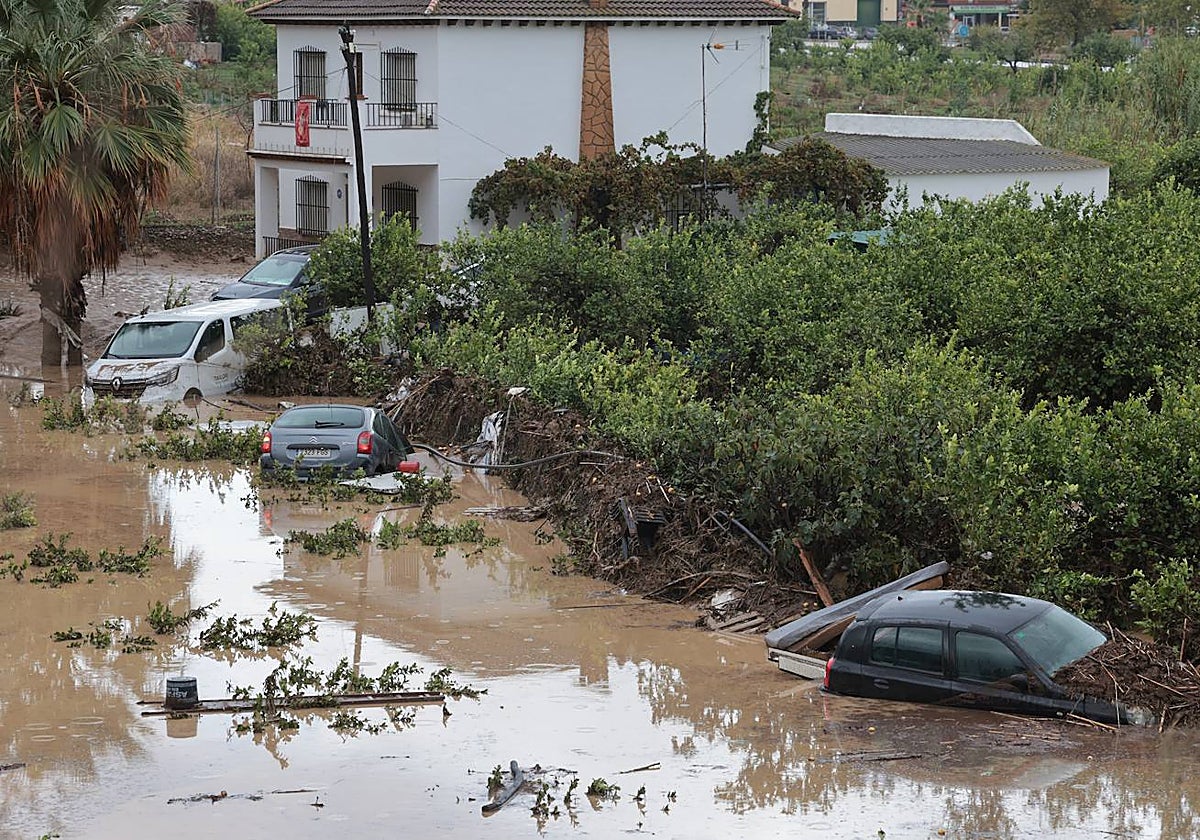Residents of Malaga towns devastated by floods: 'We have nothing left, just the clothes we are wearing'
The torrential downpours that hit the province on Tuesday flooded entire neighbourhoods in Álora, Pizarra and Cártama in the Guadalhorce valley, leaving many families with almost nothing
Some residents of the towns in Malaga province's Guadalhorce valley have been left with just the clothes on their back after the torrential downpours from the 'Dana' weather system swept through the area on Tuesday and caused major flooding and damage to homes.
Paco Fernández and his wife Isabel lost everything. With barely time to react, flood waters caused by the overflowing Guadalhorce river gushed into their house in Álora and swept away their belongings. "We have lost our life savings," they said.
This couple live in the La Isla neighbourhood, very close to the riverbed, which was one of the worst affected areas by the flooding in Malaga province. They needed to be rescued by a Guardia Civil helicopter after the water swept through their entire house. "In less than five minutes a huge wave came and swept everything away," they said.
Related news
Moments after being rescued, they said that they made a decision to leave the house after seeing how heavily the rain was falling, but they did not have time to get to the car, which was parked less than ten metres away. In an instant, the water gushed inside, forcing them to run upstairs.
Both took shelter on the roof of their two-storey house and waited to be rescued while emergency workers rescued other families in the surrounding area. "The performance of Guardia Civil has been exemplary; they took very little time to rescue us. It was all very quick," the couple said.
They were shocked and could not quite believe what had occurred, lamenting that this was the second time this had happened to them after suffering through the floods of 2012. The pair criticised authorities, who they claim had not cleaned the riverbed since then, causing an accumulation of reeds and weeds.
A similar situation happened to Silvia Ávila and Eleuterio Torres, a couple who live in the La Hermosa area. Both left home before 8am and when they returned, they found themselves with nothing. "We have been left with nothing but the clothes we have on our backs," she said. Without money, clothes or a place to sleep, they decided to spend the night at a relative's house, but they don't know what they will do next. "The water has almost reached the roof; we have lost an entire furnished house."
Trains affected
The most critical situation was in the area around Álora station, where the Cercanías, Media Distancia and AVE trains were all disrupted. "We were on our way to Seville when they told us that we have to get off here; they don't know when we will be able to continue," said Laura as she filmed a Guardia Civil helicopter trying to rescue several flooded cars. "It's unbelievable what has happened in just a moment."
Many of the cars she was filming belong to workers from the company Leba, which has a warehouse in the area. "Many parked here this morning and have gone to Malaga to work, so they have no idea what has happened," said one worker. "There are at least ten or 20 cars under water," added another.
The rain also wreaked havoc on numerous orange and lemon groves, many of which were even on the edge of the road after being washed away by the river. Some belonged to Francisco, a villager who had (until Tuesday) a small field. "We have lost everything; now we have no choice but to pull up all the oranges and lemons and wait for next year," he said.
Gonzalo Pérez is another of the people affected by the rain. Although in his case, the despair was not because he had lost his belongings but because he was unable to pick up his children. Yesterday morning, as he does every day, he dropped them off at the Guadalhorce school, and at noon he discovered the road he needed to use to pick them up was cut off by floodwaters.
He pointed out that when he dropped them, off it was raining "normally", but the situation became much worse. "Almost all the children are from that area (on the other side of the river), but some of us parents live in the centre of Álora and we don't know how to get there."
In a frustrated attempt, Gonzalo tried to cross the flooded road on foot, but finally gave up when he realised it was quite deep. "The fear I have is that it will get dark and the kids will get scared; they should help us cross," he added.
After 2pm, the situation began to return to normal in the area. The rain gave way and the A-7077, which links the Álora station with Malaga, was reopened. Even the sun began to peek through the clouds. But that could not keep people's eyes off the sky, as another night of rain was forecast. "I don't think we will be able to sleep today," Silvia said.
From Álora to Cártama
As the afternoon progressed, the situation became more complicated in the area around Cártama, where the Guadalhorce river also overflowed its banks. The main incidents were recorded from 4pm onwards. In the municipality, homes, businesses and infrastructures were damaged.
The neighbourhood of Doña Ana, located in an area close to the Guadalhorce riverbed, was one of the worst affected. Faced with the overflow alert, many residents in the lower areas took preventive measures, sealing doors and windows, and even evacuating their homes. However, some residents in higher areas decided to stay in their homes. Town hall reported that no rescues were carried out.
The increase in the Guadalhorce's flow also caused problems for key infrastructure, such as the A-7059 road bridge, which crosses the river and had to be closed due to an accumulation of reeds and debris. "The river is dragging a lot of reeds, and we don't know if this could have any effect on the bridge over the motorway, which has a smaller eye than the bridges over the Cártama station," said mayor Jorge Gallardo. To clear the bridge and facilitate the flow, a mechanical arm was moved while emergency crews monitored the stability of the bridge. The pedestrian area of the bridge was also closed as a safety precaution.
From 11.30am, the council activated its emergency plan and deployed all necessary resources to protect residents and minimise damage in the municipality. Heavy rains formed pools of water on several roads, making traffic difficult on numerous stretches. César Rodríguez, a local student, said the bridge at Prolongo, which connects to the train station, was "muddy and full of manure", making it impossible for him to get around. The track connecting Cártama with Estación de Cártama was temporarily closed during the early hours of the morning due to flood waters, and the subway under the train tracks at Estación de Cártama remained flooded. Local Police diverted traffic and warned drivers of the risks in these areas, while traffic authorities recommended avoiding unnecessary journeys and opting for alternative routes.
By the end of Tuesday, Cártama was facing a scenario of significant damage and a tough clean-up and repair challenge. With the storm subsiding, the municipality is now preparing to assess the damage.




